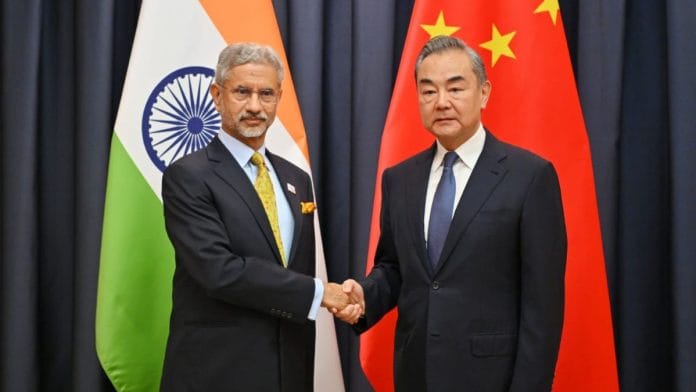New Delhi: In the first high-level meeting between India and China since the Prime Minister Narendra Modi-led government secured a third term, External Affairs Minister S. Jaishankar discussed early resolution of the border issue with his Chinese counterpart Wang Yi Thursday morning.
Jaishankar told the Chinese foreign minister that respecting the border is essential. According to a readout from the Ministry of External Affairs (MEA), both ministers agreed that ‘prolonging’ the current situation would not be in the best interests of either side.
The meeting took place on the sidelines of the Shanghai Cooperation Organisation (SCO) Summit held in Astana, Kazakhstan.
According to a statement by the Indian foreign minister, the two “discussed early resolution of remaining issues in border areas” and “agreed to redouble efforts through diplomatic and military channels to that end”.
“Respecting the Line of Actual Control (LAC) and ensuring peace and tranquility in the border areas is essential. The three mutuals — mutual respect, mutual sensitivity and mutual interest — will guide our bilateral ties,” he added.
The Chinese readout, meanwhile, said, “It is necessary to adhere to a positive thinking, properly handle and control the situation in the border areas on the one hand, and actively resume normal exchanges on the other hand.”
It added that China and India, as countries in the Global South, should work together to oppose “unilateral bullying, resist bloc confrontation, safeguard the common interests of developing countries, and make due contributions to regional and world peace, stability and development”.
During talks, Jaishankar reiterated the “importance of fully abiding by relevant bilateral agreements” as well as protocols reached between the two governments in the past.
This is the first meeting between the two foreign ministers in nearly a year, while the border standoff in Eastern Ladakh continues to strain ties for over four years now. Indian and Chinese soldiers clashed in Galwan Valley in June 2020, adversely affecting bilateral relations.
During talks with Wang, Jaishankar also pushed for the Working Mechanism on Consultation and Coordination on India-China Border Affairs (WMCC) to hold an early meeting. This March, the 29th meeting under this mechanism was held and attended by MEA’s Joint Secretary (East Asia) and the Chinese foreign ministry’s Director General of the Boundary & Oceanic Department.
India and China have so far held 29 Working Mechanism for Consultation and Coordination on India-China Border Affairs (WMCC) talks to resolve the border tensions, besides 21 rounds of military talks.
While both sides have disengaged from the immediate friction points in Eastern Ladakh, there has not been any de-escalation along the LAC and disengagement in areas like Depsang Plains, which predates the current standoff.
Earlier in February, Jaishankar and Wang briefly met on the sidelines of the Munich Security Conference in Germany. Last July, they held a bilateral meeting on the margins of the ASEAN Regional Forum (ARF) Ministerial Meeting in Jakarta, Indonesia.
While India has maintained that bilateral ties with China cannot return to normal unless there is peace in the border areas, Beijing has insisted for the issue to be compartmentalised in the broader relationship.
Wang is part of a high-level delegation led by Chinese President Xi Jinping, who is attending the SCO Summit in Astana. Prime Minister Narendra Modi skipped this year’s SCO conclave, a multilateral platform that is increasingly being seen in contrast to groupings led by the US and its allies.
On Wednesday, Jaishankar met counterparts from Belarus, Tajikistan and Uzbekistan as well as United Nations (UN) Secretary-General António Guterres on the sidelines of the summit.
Last month, Jaishankar held a meeting with the new Chinese Ambassador to India, Xu Feihong, where the two exchanged views on India-China relations and other issues of common interest. In a statement following the meeting, however, the new Chinese envoy remarked that he looked forward to working with New Delhi to push the development of India-China relations “towards the right direction”.
(Edited by Mannat Chugh)
Also Read: SCO meet: Jaishankar tells Lavrov to safely return Indians caught in Russia’s war with Ukraine







A time for patient, constructive diplomacy. Former NSA M K Narayanan has written how he sometimes used the Special Representatives mechanism to deal with points of stress that had developed in the relationship. It was not only about the boundary question. The last meeting of the SRs took place five years ago. It would mark the resumption of a political dialogue, which former FS Vijay Gokhale has called for.